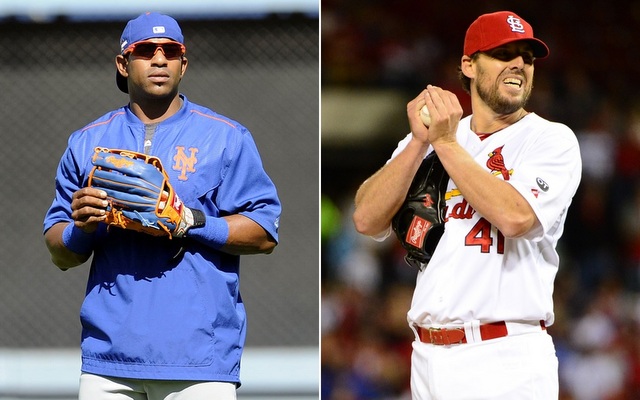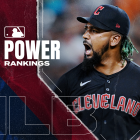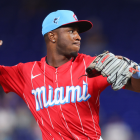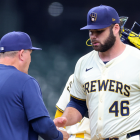Pitchers and catchers have started reporting to spring training across Florida and Arizona, which means the offseason is officially over. And not a moment too soon. This winter seemed extra long and extra weird. There were lots of out-of-nowhere moves and rumors this winter.
Although there are still several quality free agents still available -- seriously, someone go sign those guys already -- it's time to take a step back and look at the very best moves of the winter. This is entirely subjective, of course, so you're very welcome to disagree. Obviously acquisition cost is a big factor here, but fit is also important. Here are our top five moves of the 2015-16 offseason.
1. Mets re-sign Yoenis Cespedes to a three-year, $75 million contract.
I have to admit, I didn't expect the Mets to go through with it. The club has infamously operated on a tight budget in recent years -- they've had a bottom third payroll for a few seasons now despite playing in the game's largest market -- and it seemed like their interest in Cespedes was for show. They wanted him for three years, but c'mon, he wasn't going to take that, right?
Well, he did. Late last month Cespedes agreed to return to the Mets, taking a three-year contract worth $75 million. He reportedly turned down a $100+ million offer from the division rival Nationals too. Cespedes can opt-out after the first year and leave $48 million on the table, and it's is very possible (if not likely) he will do so. The Mets might be hoping he opts out too. That limits the risk and allows them to recoup a draft pick next offseason.
On the field, Cespedes is something less than a perfect fit because he's going to have to play center field, but he gives the Mets some much needed middle of the lineup thump and credibility with their fans. Cespedes quickly became a fan favorite in Flushing and letting him walk after the team got to the World Series would not have gone well. I saw and heard many fans assuming he was gone at the outset of the offseason. They didn't expect the Mets to pay to keep him.
Instead, the Mets kept the fan favorite, kept the middle of the order hitter, and kept the contract short. It's a win-win-win. New York's best chance to win the World Series is right now, while their rotation is young and cheap, and bringing Cespedes back increases their chances of a title considerably, even if he doesn't repeat his MVP caliber 2015 performance. That they got him on such favorable contract terms is a huge coup.
2. Cubs sign John Lackey to a two-year, $32 million contract.
Last season Lackey ranked eighth in WAR (5.7), ninth in innings (218), tenth in ERA (2.77), and tenth in ERA+ (143) among all pitchers, not just National Leaguers. His reward? A little two year contract worth $16 million per year in an offseason in which eight starters signed deals worth $70 million or more:
David Price, Red Sox:, Seven years, $217 million
Zack Greinke, Diamondbacks: Six years, $206.5 million
Johnny Cueto, Giants: Six years, $130 million
Jordan Zimmermann, Tigers: Five years, $110 million
Jeff Samardzija, Giants : Five years, $90 million
Mike Leake, Cardinals: Five years, $80 million
Wei-Yin Chen, Marlins: Five years, $80 million
Ian Kennedy, Royals: Five years, $70 million
Of those eight, Price and Greinke are the only two I would confidently project to outperform Lackey in 2016.
True, Lackey's age (37) played a big role in the short contract, and true, being tied to draft pick compensation hurt his market as well, but this is a bonafide above-average workhorse starter who's shown he can pitch near the front of a rotation and help carry a club to a World Series title. He did with the Angels and he did it with the Red Sox.
Lackey has been outstanding since missing the 2012 season due to Tommy John surgery -- he has a 3.35 ERA (119 ERA+) in 605 1/3 innings with his new elbow ligament -- and the Cubbies are only asking him to solidify the middle of their rotation, not lead it. Jake Arrieta and Jon Lester will do that.
Giving up a draft pick always stinks, but getting a veteran pitcher of Lackey's caliber at such an affordable rate is a fantastic deal in my book. He's the perfect No. 3 starter for Chicago.
3. Padres trade Craig Kimbrel to Red Sox for four prospects.
There's nothing a rebuilding club needs less than an expensive closer. Kimbrel is no longer cheap -- he's owed $11.25 million in 2016 and $13.25 million in 2017 -- and an argument can be made his best years are already behind him. The Padres needed to restock their farm system and shed some payroll, and dealing Kimbrel was the best way to accomplish both.
The Red Sox were happy to take Kimbrel off San Diego's hands. In return, they sent four prospects to the Padres: outfielder Manuel Margot, shortstop Javier Guerra, left-hander Logan Allen, and infielder Carlos Asuaje. Asuaje is a utility player with a chance to make the team's Opening Day roster, and Allen is a lottery ticket 18-year-old drafted just last year.
Margot and Guerra are the real prizes. Both were highly regarded prospects prior to the trade, and their recent placement in the various top 100 prospects lists bear that out:
| 2016 Top 100 Ranks: Manuel Margot & Javier Guerra | |||||
| Baseball America | Baseball Prospectus | ESPN | MLB.com | Average | |
|---|---|---|---|---|---|
| Margot | 56 | 14 | 25 | 45 | 35 |
| Guerra | 52 | 56 | 34 | 58 | 50 |
The Padres not only shed Kimbrel's contract, they also traded him for two consensus top 50 prospects, an interesting third prospect, and a big league ready utility man. That's a very nice haul for GM A.J. Preller, especially since Margot and Guerra could be MLB ready within a year and play positions of long-term need. Very nice deal.
Now, just to be clear, just because I feel the Kimbrel trade was a great move for the Padres does not automatically mean I think it was a bad move for the Red Sox. I think it was a perfectly sensible move for Boston. They're a win-now team, they had an obvious need in the bullpen, they can afford Kimbrel's salary, and they have a ton of prospect depth. Giving up some pieces for a pitcher of Kimbrel's caliber made sense for them.
4. Dodgers re-sign Howie Kendrick to a two-year, $20 million contract.
There is no better example of the qualifying offer hurting mid-range free agents. Kendrick is a very good and very consistent player. He is only 32, he plays an in-demand position, and he hits for average (.295 in 2015 and .293 since 2012) in an age when hitters are piling up strikeouts.
Heading into the offseason, the crowdsourcing results at FanGraphs pegged Kendrick for a four-year contract worth $52 million. He didn't get even half that. Few teams showed interest throughout the winter -- the Diamondbacks and Nationals were connected to him at one point -- and Kendrick wound up returning to Los Angeles, but only after he expressed a willingness to play some third base if necessary.
The broken qualifying offer system screwed Kendrick over and gave the Dodgers a fantastic value deal. Their infield was looking pretty thin -- Justin Turner is coming off microfracture knee surgery and they had a Chase Utley/Enrique Hernandez platoon penciled in at second -- and Kendrick gives them a proven above-average player on a short-term contract at a well-below market salary.
5. Yankees acquire Aroldis Chapman from Reds for four prospects.
The Chapman trade was the result of extenuating circumstances. Back in October police were called to his Miami home for a domestic dispute incidenct. No arrests were made at the time and we recently learned Chapman will not be charged with a crime.
Still, even with no arrests or charges, MLB teams considered Chapman persona non grata. He was on the verge of being traded to the Dodgers when news of the domestic dispute broke, and Los Angeles immediately backed out of the deal. It appeared the Reds were going to be stuck with him until the Yankees expressed an interest in December.
New York eventually acquired Chapman for four prospects: third baseman Eric Jagielo, right-hander Rookie Davis, right-hander Caleb Cotham, and second baseman Tony Renda. Not only did none of the four appear on a single top 100 prospect list this spring, only one (Davis) is considered a top 10 prospect in Cincinnati's system according to Baseball America.
Yankees GM Brian Cashman admitted the team jumped on Chapman because the Reds' asking price dropped following the domestic dispute incident, which is sort of gross, and Chapman very well could (and likely will) be suspended under MLB's domestic violency policy for some length of time. We should hear about a suspension soon enough.
From a pure baseball perspective -- and that's what we're focusing on here -- it's an outstanding move. The Yankees acquired arguably the best reliever in the world for four non-top prospects. A few months ago getting Chapman for that sort of package was unthinkable. The Yankees have already taken a PR hit following the move and deservedly so. On the field, Chapman makes them a lot better.
Honorable Mention: Phillies trade Ken Giles and a prospect to the Astros for five young players; Mariners re-sign Hisashi Iwakuma; Cubs sign Ben Zobrist.
Coming Friday: The five worst moves of the offseason.


















